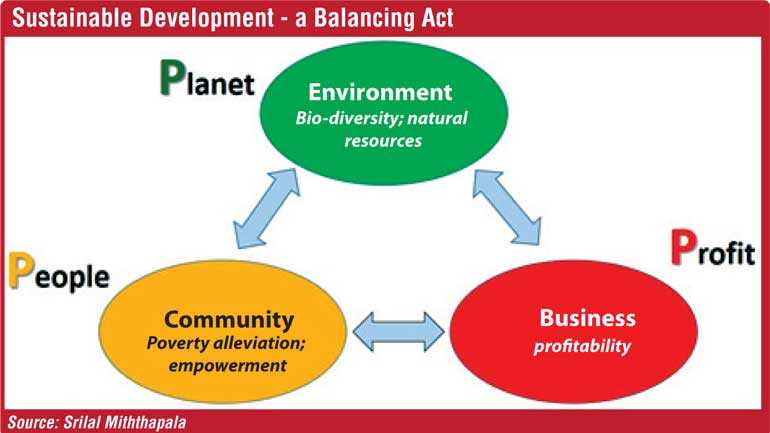Saturday Feb 28, 2026
Saturday Feb 28, 2026
Wednesday, 24 October 2018 00:00 - - {{hitsCtrl.values.hits}}


Sustainability is fast becoming a very relevant and essential aspect of our lives. This has come about as a response to the high degree of consumerism that prevails in the world today, and the resulting overuse of fast-depleting natural resources, giving rise to global warming and climate change. In the quest for sustainability, the competitive business landscape is already starting to transform, forcing companies to change the way they think about products, technologies, processes, and business models.
Sustainable growth and development calls for a balance and harmony between environment sustainability, economic sustainability and socio-political sustainability, commonly referred to as the three P’s - Planet, Profit and People.
However, the idea of environmentally sustainable growth is not new. Many cultures and regions over the course of human history have recognised the need for harmony between the environment, society, and economy.
Buddhism is the fourth largest religion in the world, with some 520 million followers around the world, having its origins about 2,500 years ago, based on the life and teachings of Siddhartha Gautama, known as the Buddha. Unlike other mainstream religions, Buddhism is more of a philosophy or way of life. It calls for leading a balanced moral life, mindful and aware of one’s thoughts and actions, mutual dependence of all phenomena, and to develop wisdom and understanding of all things around us - most of which relate to the basic principles of sustainability.
The principles
of sustainability
While there are a whole array of definitions of sustainability, I have amalgamated several to coin the following: “sustainable development is development that meets the present needs, while protecting and enhancing opportunities for all stakeholders for the future.”
There some key words in this definition that are of importance. ‘Present needs’ indicates that sustainability is not about stifling development, contrary to what many myopic environmentalists preach in the guise of sustainability. It actually encourages development, but at the same time, there is the need, not only to protect, but also to enhance opportunities for the future. Hence this means that while current development must be encouraged, it is vital that the environment and socio-cultural aspects must be safeguarded and enhanced for the future in an all-encompassing manner.
It is thus obvious that sustainable development is about striking a balance between development (businesses), community (people) and the environment. This is referred to in business, as the ‘triple bottom line’ and also called ‘The People, Planet and Profit’ approach.
Buddhism
Buddhism is a religion to about 300 million people around the world. The word comes from ‘budhi’, ‘to awaken’. It has its origins about 2,500 years ago, when Prince Siddhartha Gautama, known as the Buddha, was himself ‘awakened’ after searching for several years to find the key to real happiness. The Buddha discovered in his enlightenment, that a middle path of moderation was the solution. 
To many, Buddhism goes beyond religion, and is more of a philosophy or way of life. It is a philosophy because philosophy means ‘love of wisdom’, and the Buddhist path can be summed up as:
1.Moral guidelines based on non-harming
2.Central law of interdependence and causation
3.Belief in liberation from suffering through insight
4.Practices that strengthen intention and compassion
The Noble Eightfold Path is the bedrock of Buddhist teachings, and it calls for being moral, focusing the mind on being fully aware of our thoughts and actions, developing wisdom by understanding the Four Noble Truths, and by developing compassion for others.
Hence in general, Buddhist teachings always encompasses the basic building blocks of sustainability. The middle path, moderation, leading a moral life, and being mindful and aware of thoughts and actions, are all part of the foundations of sustainability. That is, concern for the environment, people and the business, operating in a moderate manner when it comes to consumption of all resources needed for the business.
Buddhism and
the environment
Buddhism teaches that there can be no human life without nature. This implies that every single life form on Earth is considered interdependent, and cannot survive without the help and existence of nature.
The Buddha taught people to respect human life and nature. Human life and nature should be in harmony, without over-exploiting nature to get more than what is needed.
In one example, the Buddha said: “A butterfly or bee collects nectar from a flower without hurting or destroying the flower, and in return, the flower will give back a fruit. That fruit will give more trees and flowers and this cycle will continue.”
This is why it can be stated that Buddhism has an environmentally-conscious view, and Buddhist reality is ecological.
Buddhism sees the world from an eco-centric point of view, which means according to Buddhism, humans are subject to nature, rather than control it. Both Buddhism and eco-centrism focus on protecting holistic natural entities, such as species and ecosystems.
This is exactly what environmental sustainability is. It is interacting, appreciating and using nature as an integral part of our lives, and respecting it in whatever development that is done.
Today, all large development projects require an Environment Impact Assessment study (EIA) to be carried out. However this should be viewed as only a minimum guideline, and real sustainable development needs to pursue a greater moral goal of protecting, nurturing, and enhancing the environment. Many business entities simply follow the letter of the law and do just what is needed to pass the test within the confines of their enterprise. However, real sustainability should reach beyond these borders to encompass sound environment protection practices through both forward integration and backward integration.
For example, larger corporates can pressurise suppliers to use more sustainable and environmentally-friendly packaging (backward integration). In a similar manner, they can ensure that their distribution channels for products follow sustainable consumption practices (SCP; forward integration). Just because these actions are remote and away from the enterprise, it does not mean that its responsibility ends there i.e. the ‘out of sight, out of mind’ syndrome.
A good example is the hotel and tourism industry (where I come from). Most hotels now have a garbage-sorting scheme in place. The sorted garbage is then taken away by some contractor for disposing of it in a ‘sustainable and environmentally-friendly manner’. Hopefully! How many of these hotels really know what happens to this garbage that was so carefully sorted when taken away? Is it really recycled as one thought? Or is it dumped in some unused paddy field? Out of sight, out of mind!
Buddhism and the community
The Buddha teaches of compassion to oneself (suwapath-wewa) and to the rest of the world, society and community, taking care of oneself physically and mentally.
The Noble Eightfold Path, which encapsulates the core Buddhist precepts talks about
This is what the community angle of sustainability is about. It is one of the most neglected aspects of sustainability. It is about doing one’s business while giving due consideration to the community that interacts with it. Many businesses are started and operated without any thought about the people who are affected by and interact with the business in a peripheral or indirect manner. Disregarding this important aspect may result in alienation of the community, distrust, and antagonism, eventually leading to disruptions to the business activities.
Taking another example from tourism, in the days gone by, hotels were built in the most pristine, and undisturbed environments, with scant respect to the communities surrounding them. The principle was to completely shut the community out of all activities. It is only in the last decade or so that the hotel industry has begun to reach out to the community, and try and involve them in some of the operational activities, so that they would also reap some benefits from the business. Some examples are buying locally grown products, experiencing a village life, and hiring of local guides.
This is what the Buddha taught – to practice generosity, gratitude and kindness to all beings.
Buddhism and business
The wise and moral man shines like a fire on a hilltop
Who does not hurt the flower.
Such a man makes his pile as an anthill, gradually
Grown wealthy, he thus and firmly binds his friends to himself.
– Singaalovaada Sutra
Often one would not relate Buddhist teachings into the commercial corporate world of business.
But looking at business activities through the lens of sustainability and Buddhism, there are several areas of importance. Buddhism teaches its followers to take greater personal responsibility for their actions, to have a healthy detachment where necessary, and embrace a wholesome view of their actions. This focus will help in the day-to-day decision-making of the business. Even risk-taking and innovation, which are crucial in today’s competitive business climate, will benefit from mindfulness to be able to exploit opportunities, as and when they arise.
Spiritual rationales for goals and activities can complement commercial ones. When the work environment is based on moral and ethical precepts, there are immense benefits that accrue both tangibly and intangibly.
“None can live without toil, and a craft that provides your needs is a blessing indeed. But if you toil without rest, fatigue and weariness will overtake you, and you will denied the joy that comes from labour’s end.” -

Dhammavadaka
One of the values of practicing Buddhism is a focus on mindfulness and balance. It is therefore acceptable to enjoy the fruits of your labour. It is also of acceptance that the rat race may be necessary, but that it may not be the only way.
“Develop the mind of equilibrium. You will always be getting praise and blame, but do not let either affect the poise of the mind: follow the calmness, the absence of pride.” - Sutra Nipata
Buddhist teachings call for the mind and heart to be balanced, objective, and have only mindful pride. Mindfulness has benefits that span many occupations and fields, and indeed most people will benefit from adhering to this. Being calm and not too obsessed about positive or negative feedback, enjoying the great moments of achievement, and reflecting on the moments of failure, are all the hallmarks of good management of businesses.
“He who is skilled in good, and wishes to Attain that state of Peace, should act thus:
He should be able, upright, perfectly upright, Amenable to corrections, gentle and humble.” - Metta Sutra Verse 1
In a nutshell, the basic Buddhist principle that can be applied to businesses are
Conclusion
From the foregoing, it is quite evident that that Buddhism reinforces the concepts of modern-day sustainability. Long before sustainability and environment conservation became buzzwords, the 2,500 year old teachings of The Buddha was promoting the same ideas.
Sri Lanka is considered to be the seat of Buddhism in this part of the world. Sri Lanka is also considered to be one of the most environmentally diverse bio-diversity hot spots in the world.
Hence there is no question that Sri Lanka has to be a shining example to the world, as a crucible of the rich teachings and practices of the Buddha, in a responsible and sustainable environment.
The million rupee questions is “Are we such an example?”
References
https://www.wisdompubs.org/book/business-and-buddha/praise
https://theconversation.com/what-business-can-learn-from-buddhism-84413
https://www.forbes.com/sites/forbesleadershipforum/2014/09/08/why-you-should-be-practicing-buddhism-business/#3322180d710a
https://theconversation.com/what-business-can-learn-from-buddhism-84413
https://studybuddhism.com/en/essentials/how-to/5-buddhist-principles-to-help-run-a-business
Pix by Srilal Miththapala